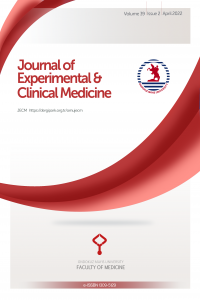Abstract
Objective
Willingness To Respond (WTR) is the measurement of employees' preferences to come to work during off-hours when needed. Are these answers given before a disaster realistic? Another question of the study was, "Can we speed up the required staff to reach the hospital?"
Methods
WTR survey has applied to emergency service staff. After that, the off-duty staff was called to work at a time they did not know beforehand. The study tried to identify how much WTR reflected the reality.
Results
Ninety of 98 (91.8%) participants whose surveys were evaluated answered "Yes" to "If you are called in case of disaster, would you come to duty?" question. When asked whether they will come to work according to disaster types, this rate was measured as 36.7% in "In the case of an infectious disease of which treatment is not clear".
Conclusions
WTR surveys can be used to predict the level of participation of staff on off-hours in meeting the need for additional labor. These surveys' results can be expected to be similar to the labor participation rates in case of a real disaster and the arrival time of the staff at the hospital can be improved with new communication methods.
References
- The United Nations Office for Disaster Risk Reduction. UNISDR - Terminology. The United Nations Office for Disaster Risk Reduction. [online] [access date: 10/14/2013] http://www.unisdr.org/we/inform/terminology.
- California Emergency Medical Services Authority (EMSA). Hospital Incident Command System Guidebook. California: The Institute; 2006.
- Garshnek V, Burkle FM Jr. Telecommunications Systems in Support of Disaster Medicine: Applications of Basic Information Pathways. Annals of Emergency Medicine. 1999, 34: 213-8.
- Ogedegbe C, Nyirenda T, DelMoro G, Yamin E, Feldman J. Health care workers and disaster preparedness: barriers to and facilitators of willingness to respond. International Journal of emergency medicine, 2012; 5(1): 1-9.
- Qureshi K, Gershon MR, Sherman MM, Straub MT, Gebbie ME, et al., Health care workers’ ability and willingness to report to duty during catastrophic disasters. Journal of Urban Health, 2005; 82(3): 378-88.
- Steffen C, Masterson L, Christos S, Kordick M. Willingness to respond: a survey of emergency department personnel and their predicted participation in mass casualty terrorist events. Annals of Emergency Medicine, 2004; 44.(4): 34
- 6. Masterson L, Steffen C, Brin M, Kordick MF, Christos S. Willingness to respond: of emergency department personnel and their predicted participation in mass casualty terrorist events. The Journal of emergency medicine, 2009, 36.(1): 43-9.
- Kruus L, Karras D, Seals B, Thomas C, Wydro G Healthcare worker response to disaster conditions. Academic Emergency Medicine, 2007; 14(5S): 189-189.
- Mackler N, Wilkerson W, Cinti S Will first-responders show up for work during a pandemic? Lessons from a smallpox vaccination survey of paramedics. Disaster Management & Response, 2007; 5(2): 45-8.
- DiMaggıo C, Markenson D, Loo GT, Redlener I. The Willingness of U.S. Emergency Medical Technicians to Respond to Terrorist Incidents. Biosecurity and bioterrorism: biodefense strategy, practice, and science, 2005; 3(4): 331-7.
Abstract
References
- The United Nations Office for Disaster Risk Reduction. UNISDR - Terminology. The United Nations Office for Disaster Risk Reduction. [online] [access date: 10/14/2013] http://www.unisdr.org/we/inform/terminology.
- California Emergency Medical Services Authority (EMSA). Hospital Incident Command System Guidebook. California: The Institute; 2006.
- Garshnek V, Burkle FM Jr. Telecommunications Systems in Support of Disaster Medicine: Applications of Basic Information Pathways. Annals of Emergency Medicine. 1999, 34: 213-8.
- Ogedegbe C, Nyirenda T, DelMoro G, Yamin E, Feldman J. Health care workers and disaster preparedness: barriers to and facilitators of willingness to respond. International Journal of emergency medicine, 2012; 5(1): 1-9.
- Qureshi K, Gershon MR, Sherman MM, Straub MT, Gebbie ME, et al., Health care workers’ ability and willingness to report to duty during catastrophic disasters. Journal of Urban Health, 2005; 82(3): 378-88.
- Steffen C, Masterson L, Christos S, Kordick M. Willingness to respond: a survey of emergency department personnel and their predicted participation in mass casualty terrorist events. Annals of Emergency Medicine, 2004; 44.(4): 34
- 6. Masterson L, Steffen C, Brin M, Kordick MF, Christos S. Willingness to respond: of emergency department personnel and their predicted participation in mass casualty terrorist events. The Journal of emergency medicine, 2009, 36.(1): 43-9.
- Kruus L, Karras D, Seals B, Thomas C, Wydro G Healthcare worker response to disaster conditions. Academic Emergency Medicine, 2007; 14(5S): 189-189.
- Mackler N, Wilkerson W, Cinti S Will first-responders show up for work during a pandemic? Lessons from a smallpox vaccination survey of paramedics. Disaster Management & Response, 2007; 5(2): 45-8.
- DiMaggıo C, Markenson D, Loo GT, Redlener I. The Willingness of U.S. Emergency Medical Technicians to Respond to Terrorist Incidents. Biosecurity and bioterrorism: biodefense strategy, practice, and science, 2005; 3(4): 331-7.
Details
| Primary Language | English |
|---|---|
| Subjects | Health Care Administration |
| Journal Section | Clinical Research |
| Authors | |
| Early Pub Date | March 18, 2022 |
| Publication Date | March 18, 2022 |
| Submission Date | November 29, 2021 |
| Acceptance Date | January 18, 2022 |
| Published in Issue | Year 2022 Volume: 39 Issue: 2 |
Cite

This work is licensed under a Creative Commons Attribution-NonCommercial 4.0 International License.


